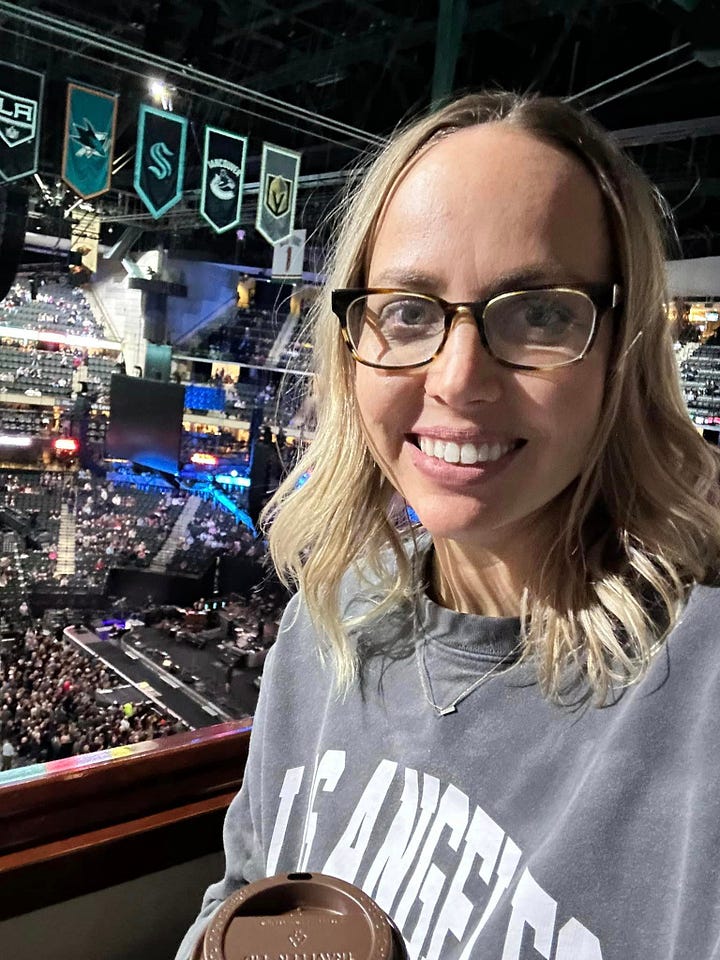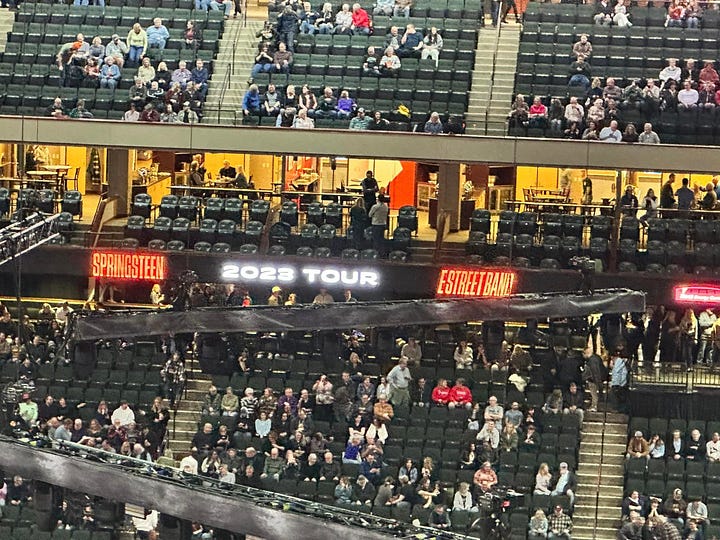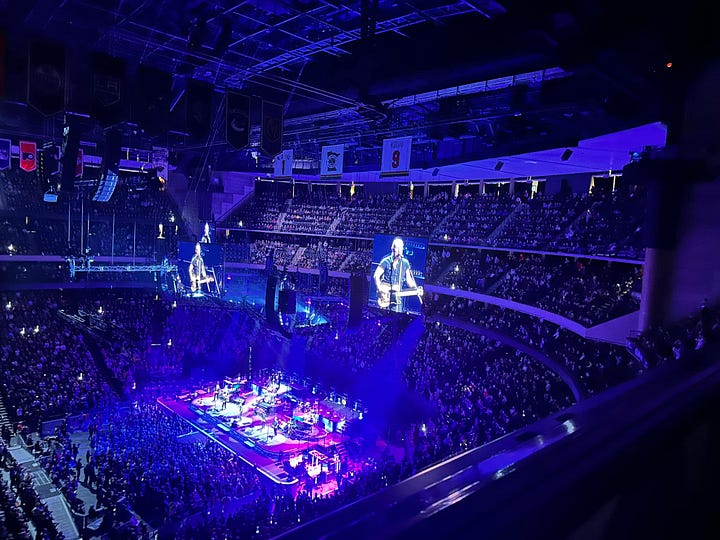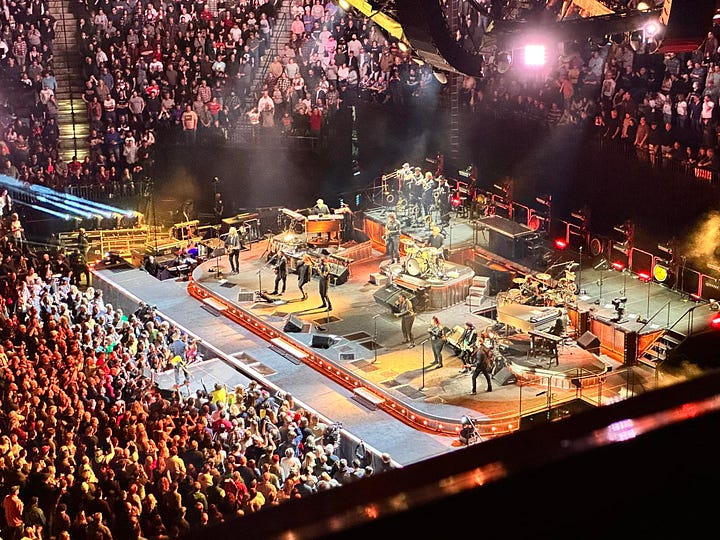How can a poor man stand such times and live?
On seeing The Boss, and insistent joy ...
Last week I got to see Bruce Springsteen in concert. I was going to say I saw my favorite _______, Bruce Springsteen, in concert - but then I had a hard time categorizing him. My favorite singer? Well, he’s much more than a singer. My favorite rock star? He’s different than the prototypical rock star. My favorite activist? My favorite band leader? My favorite celebrity?
None of theses words seemed to fit, but suffice it to say that it has been almost 48 hours since the concert and I’m still listening to Bruce’s live music on repeat.
My basketball-obsessed husband told me Bruce is my “Kobe Bryant,” so maybe that helps you understand.
I won’t bore you with the complete history of my love for Bruce Springsteen, but I will share a few highlights:
It’s 2003, and I’ve recently bootleg-downloaded Bruce’s entire Greatest Hits album via my family’s dial-up internet. I leave the computer on overnight to finish each song. Then, I leave it on for days to burn to a CD-R. I pull out a black Sharpie to write Bruce in large letters. Then I listen to it on my Discman everywhere I go, including a family road trip.
It’s a few months later in 2003, and my high school submitted a call for graduation speeches. I write one entirely based on Born to Run. I may have mistaken the word “tramps” for “champs” in the initial draft. Disappointingly, my speech is not selected. I stand by its contents.
It’s 2009, and as a 22-year-old sportswriter in Naples, Fla., I’ve been selected to cover the Super Bowl in Tampa. The Super Bowl hotels are all a little pricy, so in order to spend more time at the preceding week’s events, I arrange to stay overnight on the couch at my friend’s boyfriend’s apartment midway between Naples and Tampa and drive in and out every day. Somehow at age 22 and working 13-hour days, this seems like a very reasonable way to handle the situation. Fortunately, though, part of my work includes Springsteen and the E Street Band’s first press conference in decades! All the sportswriters in the room - people who have met many of the country’s top athletes and coaches and sports stars - stare starstruck throughout the press conference. It’s the most spellbound and captivated I’ve probably ever seen a room of cynical journalists. We all fell a little bit more in love in Springsteen, his wife and bandmate Patti Scialfa, and the band. To a bunch of reporters accustomed to “we’re taking it one game at a time,” and “we played hard,” it was clear here that Springsteen’s group was genuinely having fun at the Super Bowl. They didn’t take themselves too seriously. And the bonds of friendship and mutual respect among the bandmates were very clear.
It’s 2017, and I’ve just moved back to Minnesota after five years working as an ordained pastor in Las Vegas, Chicago, and Southern California. By now I’m a married mom of 2 and trying to figure out how to balance the intensity of parenting with my passion for writing, speaking, and preaching. On this November day, I’ve just been notified that the pastoral job I planned to start the following week was falling through, the latest of many almost-jobs. This one, though, had been stringing me along for months. I was frightened about our financial situation without me working full-time. I’d just had a huge piece published in the Washington Post, for which I’d been paid $200. I couldn’t figure out how to make any of this sustainable, and I felt completely crushed. We’d driven the day before to my in-laws’ house in Kansas City for the Thanksgiving holiday, and I’d woken up early and driven into Kansas to a local gym to try and sweat out my frustration and anxiety. By this time I’d upgraded the Discman to an iPhone and bluetooth earphones. I popped my phone into my sleeve pocket and started running down the path:
Talk about a dream
Try to make it real
You wake up in the night
With a fear so real
You spend your life waiting
For a moment that just don't come
Well, don't waste your time waiting
Badlands, you gotta live it everyday
Let the broken hearts stand
As the price you've gotta pay
Keep pushin' 'til it's understood
And these badlands start treating us good
Well, I believe in the love that you gave me
I believe in the faith that can save me
I believe in the hope and I pray
That someday it may raise me
Above these
Badlands, you gotta live it everyday
Let the broken hearts stand
As the price you've gotta pay
Keep pushin' 'til it's understood
And these badlands start treating us good
There he was. Bruce, again. I remembered reading in his autobiography that he too had struggled with depression, even when his creative work and success was rising up. In the midst of my job loss, I’d just signed my first book deal to write Red State Christians.
Late 2017-2021: I enter countless contests on social media to try to win Springsteen on Broadway tickets. I do not win. I may have also messaged Springsteen social media accounts with stories about my need for tickets. They do not respond.
2022: I see that Springsteen is coming to the Xcel Energy Center in Minneapolis in March 2023. My husband, Ben, suggests it as a birthday gift for me. He fills out the paperwork and enters the online waiting room when the day comes. The tickets are flying like crazy. He has to go to work. We swap devices. I enter the room. I get tickets! I figure out a way to pay for them …
March 5, 2023: We’ve just finished watching 7(!) basketball games for our two sons over the weekend. A snowstorm is rolling in, and Ben has to travel for work in two days. But tonight is the night! I pull on my stocking cap, and he drops off the boys at grandma and grandpa’s. We park in the garage and walk across downtown St. Paul, tasting fat snowflakes on our tongues and hustling toward the gates. There’s an electric energy in the air. Tickets were expensive, but the show is still sold out. And what’s interesting is I wouldn’t at all say this is a rich crowd. People clearly stretched to buy tickets. Maybe it was outrageous, but then again when Bruce and the expanded E Street Band took the stage, the only thing outrageous about the night was that this 73-year-old rocker was even more delightful, energetic, and INTO IT than I remembered. (Can’t help but notice how much more we scrutinize the wealth/cost for artists/musicians/athletes compared to scrutinizing the wealth/payments to business executives and corporations in this country, by the way) His lightness was contagious. His joy spilled over as he introduced the musicians and singers and danced softly, even ripping open his shirt at the end of the night. 73! It didn’t seem possible. None of this did. We walked back out the doors 3 hours later into a full-blown blizzard. It didn’t matter. Baby we were born to run …
OK, so if you aren’t personally a big Bruce Springsteen fan, maybe the above was slightly nausea-inducing, but I had to level with you. His music, and his person, and his courage - whether it’s pushing back against big corporations in America or calling for freedom in Berlin right before the Wall came down, or being one of the first rock stars to write a song about police violence against Black people - all that which comprises Bruce Springsteen has meant a great deal to me.
Let me try and sum up quickly the most important part:
I told you I’ve been listening for the past 48 hours to live Springsteen music. A friend of mine, a fellow journalist, sent along a link to his 2007 concert in Dublin. I do this thing with music sometimes where I get obsessed with a song, and I just play it over and over and over again. This time it has been Bruce’s “How can a poor man stand such times and live?” which is a rendition of an old American protest song originally recorded on the eve of the Great Depression, on Dec. 4, 1929.
Springsteen wrote his version of the song after Hurricane Katrina, and his second verse calls out particularly the racism inherent in the lack of recovery funds and assistance for Black New Orleans residents.
Like much of Springsteen’s lyrics, the ones in this song are pretty grim:
"Well, the doctor comes 'round here with his face all bright
And he says, "In a little while you'll be all right"
All he gives is a humbug pill, a dose of dope and a great big bill
Tell me, how can a poor man stand such times and live?
He says, "Me and my old school pals had some might high times 'round here
And what happened to you poor black folks, well it just ain't fair"
He took a look around, gave a little pep talk, said, "I'm with you" then he took a little walk
Tell me, how can a poor man stand such times and live?
There's bodies floatin' on Canal Street and the levees gone to hell
Martha, get me my sixteen gauge and some dry shells
Them who's got got out of town
And them who ain't got left to drown
Tell me, how can a poor man stand such times and live?
I got family scattered from Texas all the way to Baltimore
And I ain't got no home in this world no more
Gonna be a judgment that's a fact, a righteous train rollin' down this track
Tell me, how can a poor man stand such times and live?
I can’t help but read the first verse and think about the opioid epidemic: about all the lives shattered and lost even today, as fentanyl overdose has become the leading cause of death among adults ages 18-45.
“There’s bodies floatin’ on Canal Street and the levees gone to hell.”
The fact that Springsteen cared so much about the fate of poor Black New Orleans residents maybe would have initially surprised his white blue-collar New Jersey superfans. And true to form, I will say that most of the concert attendees in Minnesota this past week fit that description: white, largely blue-collar/working-class or middle-class, though many of them are now also senior citizens.
I read comments on Springsteen’s recent podcast series with former President Barack Obama that echo some of this seeming contradiction, given that two-thirds of white voters without college degrees voted for Trump in 2020. One reviewer said he’d been a big fan, but now Springsteen was a “class traitor,” (which seemed to be a dog whistle for a race traitor). Other reviewers wrote on an album that includes Springsteen’s 1988 peace anthem in Berlin that they were angry the track included Bruce’s “political” comments (actually, he was merely speaking in support of Amnesty International and in support of the freedom of citizens even living under tyrannical governments like the Soviet Union).
Part of what I love about Bruce Springsteen is he does surprise people in this way. He refuses to conform, to fit into partisan boxes and assumptions that say someone’s political beliefs are determined by their race or their income or education level. He also refuses to back down. He was one of the first rock stars to form an interracial band. He was unequivocal about his support of America’s first Black President, despite criticism from his fans. And still to this day, it’s hard to find a working artist who speaks more clearly for working, hard-luck white Americans who often find themselves on the wrong side of the balance sheet, especially those who live outside major cities.
Why does his music resonate so deeply? I’ll tell you why it does for me.
It’s the joy and the truth wrapped together. He refuses to lie to us about America and its sins and pain and the ways that life can beat you down. He doesn’t pull punches about the ways we abandon each other, especially at the time of our deepest need, and especially those who are most vulnerable.
He doesn’t mince words, doesn’t pretend like sometimes people don’t have babies in high school or go down to the river and fight, or factories don’t pull out of small towns and leave wrecking balls behind. In Bruce’s songs, unlike for women in America, you don’t have to be a beauty. It’s alright.
Hey, what else can we do now?
Except roll down the window
And let the wind blow back your hair
Well, the night's busting open
These two lanes will take us anywhere
We got one last chance to make it real
To trade in these wings on some wheels
Climb in back, heaven's waiting down on the tracks
Oh-oh, come take my hand
We're riding out tonight to case the promised land
Oh-oh, Thunder Road
Oh, Thunder Road, oh, Thunder Road
Lying out there like a killer in the sun
Hey, I know it's late, we can make it if we run
Oh-oh, Thunder Road
Sit tight, take hold
Thunder Road
I’ve been playing “How can a poor man stand such times and live?” all day, to my family’s chagrin, and I finally think I know the answer.
It’s joy. It’s unexplainable, illogical, joy. Joy in the face of injustice and lies and corruption and death. Joy.
It’s bearing down on us all, each and every day. How can we stand such times and live?
Then I see Bruce bouncing around the stage. 73 years old. He leans his head close to the mic with his bandmates. He gestures towards them with exuberance. He tosses his guitar in the air.
We’re living.




A Few Notes …
First, a huge THANK YOU to all subscribers. I get a little email notification every time someone signs up, and every time I get one, I feel joyful and honored that you want to spend part of your day with this community. I mean it when I say: “I’m listening,” to you as well, and please don’t hesitate to share with me your thoughts + ideas for what you’d like to read in this space.
To PAID SUBSCRIBERS: I am humbled and honored that you’ve chosen to spend part of your limited budget on this newsletter. To borrow words from another newsletter I love, you are directly funding freelance journalism with your subscription, and I have to thank you more than ever for your continued support. Our world’s media and journalism is in a state of crisis, with fewer and fewer billionaires in control of global news outlets, and journalists being either laid off or threatened with violence for their work every single day; with fewer and fewer newsroom positions paying a living wage. I pledge to you to steward your paid subscription faithfully + use it to support honest, hard-working, and LOCAL journalism. One of my goals in this first year is to open this newsletter to other journalists, and pay them a fair wage for their work.
THANK YOU for your support. If you’re not a paid subscriber, please consider becoming one.
On free vs. paid-subscriber posts only: My plan right now is that the Friday + Sunday posts, focusing on news + spirituality, in that order, are available for paid subscribers only (after this first week). My plan is that the Tuesday blog-style posts will always be free, to enable as much access as possible, while creating a smaller and more intimate experience for paid subscribers, who are also able to comment and share in community in fuller ways.
Free Trial: Substack always offers a free week-long trial subscription to this newsletter, so you can get a taste of the Friday + Sunday posts and see if you’d like to subscribe!
If a paid subscription is a hardship for you, but you’d like access to the Friday + Sunday posts: PLEASE do not hesitate to reach out. I will be happy to provide a complimentary subscription for you.


Also love Bruce Springsteen! I remember he made the cover of Time and Newsweek the same week in October 1975. Being the contrarian I was at that time (I made a point of lighting up a cigarette on National Smoke Out Day even though I was not a regular smoker) I avoided buying Springsteen’s albums. Fast forward: Attended Carleton College, Northfield, MN, 1975 through the fall semester of 1976. Spring of 1977 I moved to Minneapolis, enrolled in the U of MN, and initially lived with two other Carleton transfers in a brownstone in South Minneapolis about a block away from the Minneapolis Institute of Arts. One of the roommates worked at the Children’s Theater in the MIOA. Actually, not really a roommate as I was crashing on the living room floor - at night I laid the couch cushions on the floor and slept in a sleeping bag. Supposed to be a temporary living arrangement but after a month they kindly encouraged me to find a place of my own. Anyhow, getting back to Springsteen… Born to Run was on regular rotation on the turntable (vinyl LP of course) during my “visit.” Love, love that album. Whenever I hear songs from Born to Run I can’t help but think of those bohemian days.